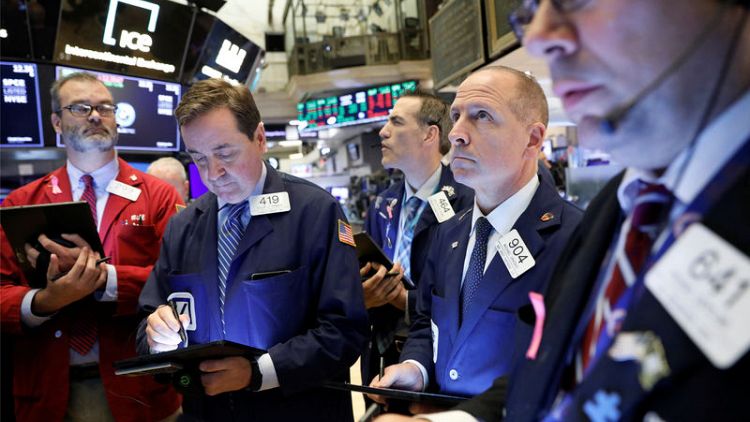By Herbert Lash
NEW YORK (Reuters) - Global stocks faltered on Tuesday as strong earnings from U.S. drugmakers Merck and Pfizer and expectations the Federal Reserve will cut rates was offset by a potential delay in a U.S.-China trade deal, which clouded sentiment and weakened the dollar.
European shares fell as companies headed toward their worst quarterly earnings in more than three years, according to the latest estimates by Refinitiv, underscoring concerns about the deteriorating health of Europe Inc.
The U.S. S&P 500 index eked out a fresh record intraday high, led by Merck and Pfizer, though a disappointing profit report from Google parent Alphabet kept the technology-rich Nasdaq in the red.
The benchmark index had breached its all-time high set in July on Monday, spurred by hopes of a U.S.-China trade deal and the likelihood of further stimulus from the U.S. central bank on Wednesday when it concludes a two-day meeting of policy-makers.
The steepening of the two- and 10-year yield curve suggests a budding risk-on sentiment among investors, now that some form of a U.S.-China trade agreement is likely, said Yousef Abbasi, global market strategist at INTL FCStone Financial in New York.
The spread in the yield curve <US2US10=TWEB> has gained about 20 basis points since leaving negative territory, a recession indicator, in early September.
However, a U.S. administration official said on Tuesday that an interim trade agreement might not be completed in time for signing in Chile next month as expected, while adding that did not mean the accord is falling apart.
Technology <.SPLRCT> shares, a sector of the S&P 500 that has been closely tied to trade progress, fell 0.92%.
Drugmakers Merck & Co Inc <MRK.N> and Pfizer Inc <PFE.N> rose after reporting upbeat third-quarter results, gaining 3.5% and 2.5%, respectively. The healthcare sector <.SPXHC>, which has been the second-worst performer among the 11 major S&P 500 sectors this year, rose 1.16% as the session's best performer. A rotation into value stocks that investors have posited for months seems be taking hold, Abbasi said, pointing to recent gains in the SPDR S&P Regional Banking ETF <KRE> as evidence. The ETF has traded below 56 since May and could be set for further upside after a recent rally from below 50, he said.
"We're seeing some of those high-flying tech names struggle," Abbasi said. "We're getting that risk-on move from sectors that have been ignored all year, the sectors that haven't been loved."
Apple <AAPL.O> and Microsoft <MSFT.O> fell, as did Amazon.com <AMZN.O>.
MSCI's gauge of stocks across the globe <.MIWD00000PUS> gained 0.05%, while the pan-European STOXX 600 index <.STOXX> lost 0.16%. MSCI's emerging markets index <.MSCIEF> rose 0.07%.
On Wall Street, the Dow Jones Industrial Average <.DJI> fell 19.26 points, or 0.07%, to 27,071.46. The S&P 500 <.SPX> lost 2.53 points, or 0.08%, to 3,036.89 and the Nasdaq Composite <.IXIC> dropped 49.14 points, or 0.59%, to 8,276.85.
Oil pared losses amid expectations that U.S. refined product stockpiles declined last week.
Brent crude <LCOc1> rose 2 cents to settle at $61.59 a barrel, while U.S. West Texas Intermediate <CLc1> crude settled down 27 cents to $55.54.
Britain's FTSE 100 <.FTSE> fell 0.34% as uncertainty over a looming general election compounded a 4.0% drop in shares of BP <BP.L> after the oil major posted a sharp drop in third quarter profit.
The losses in Europe followed a mixed performance in Asia, where Japan's Nikkei <.N225> rose 0.4% to reach levels last seen a year ago. Shanghai blue chips <.CSI300> dithered either side of flat.
Benchmark 10-year U.S. notes <US10YT=RR> rose 4/32 in price to yield 1.8367%.
The dollar index <.DXY> fell 0.09%, with the euro <EUR=> up 0.13% to $1.1112. The Japanese yen <JPY=> strengthened 0.10% versus the greenback at 108.86 per dollar.
(Reporting by Herbert Lash; Editing by Bernadette Baum and Sonya Hepinstall)



